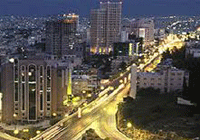
Jordan hikes gasoline, power prices
Amman, May 27, 2012
Jordan has raised the price of gasoline and electricity for major mining firms, hotels and banks, to ease its worsening budget deficit that could reach $4 billion this year, officials said.
The move, announced by the cabinet, which takes effect after midnight is the first major rise in retail gasoline prices since street protests early last year inspired by the wave of Arab unrest pushed the authorities to expand social spending and freeze fuel price hikes, including gasoline.
The prices of premium petrol would increase to 1 dinar ($1.4) from 0.795 dinars per litre - almost 20 percent - and electricity tariffs have also been substantially raised for major industrial and service sectors of the economy, including banks and hotels.
The government, mindful of public fury that exploded into street clashes in the depressed south of the country after two price hikes in 1989 and 1996, has not raised lower grade ordinary gasoline prices used by lower-income Jordanians - the majority of the country's seven million population.
Successive governments have adopted an expansionist fiscal policy characterised by sizeable state subsidies and salary increases in response to the months of protests.
To head off greater unrest, the authorities also created new state jobs in an already bloated public sector, and maintained subsidies for bread and other staple goods, further straining public funds.
In the latest sign of popular discontent, Islamist and tribal opposition groups held street protests against rising prices on Friday. Jordanian officials say the price hikes will show a serious commitment to fiscal consolidation and win the International Monetary Fund's (IMF) continued support and further aid.
The cabinet also announced long-planned electricity tariffs for certain sectors including banking, a pillar of the economy, a move that will hit the country's struggling businesses, already reeling from the slowdown.
The budget deficit has been accentuated by a soaring energy bill that hit $4.5 billion last year after the disruption of regular Egyptian gas imports that support 80 percent of Jordan's electricity generation. That forced the kingdom to switch to much more expensive diesel to cover its electricity needs.
Economists said Jordan's ability to maintain a costly subsidy system and a large state bureaucracy, whose salaries consume the bulk of the $9.6 billion of state expenditure, was increasingly untenable in the absence of large foreign capital inflows or infusions of foreign aid.
Officials say the rise in gasoline prices along with fiscal prudence and restraint will help Jordan meet an IMF-backed budget deficit target of around 6 percent of gross domestic product after grants that traditionally cover budget shortfalls. - Reuters







